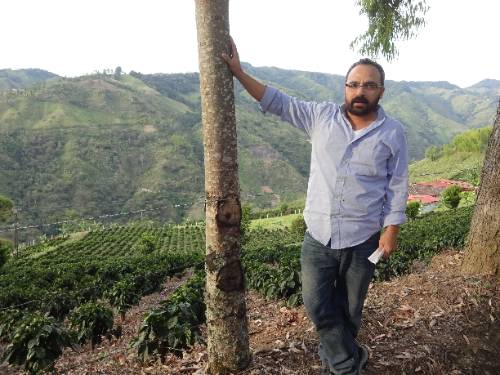Dr. Phillip A. Hough
Phillip A. Hough
Professor of Sociology
Phone:
(561) 297-0163
Email:
phough2@fau.edu
Office: CU 258/Boca Campus
Research: Political economy, labor and agrarian movements, global commodity studies, comparative and world historical sociology, Latin American development.
Teaching: Labor and globalization, sociology of food, research methods and design, sociology of development, drugs and society, economic sociology, global society, sociological theory.
Background
Phillip A. Hough is a Professor in the Department of Sociology at Florida Atlantic University and the Editor in Chief of International Journal of Comparative Sociology .
Professor Hough received his doctoral degree from The Johns Hopkins University in 2007. His main areas of expertise are political economy, labor and agrarian movements, global commodity studies, comparative and world historical sociology, and Latin American development. His research focuses on questions related to labor/agrarian struggles and global capitalism, state and paramilitary violence, class and state formation, and the social contradictions of global commodity chains. The bulk of his research draws upon qualitative and comparative-historical methods of analysis. His recent work has been published in various scholarly journals, including Politics and Society, Global Labour Journal, the Journal of World Systems Research, International Journal of Comparative Sociology, Review: A Journal of the Fernand Braudel Center, Environment and Planning A, Journal of Agrarian Change, among others.
In 2018-2019, Dr. Hough was awarded a prestigious American Council for Learned Society (ACLS) fellowship. He used this ACLS fellowship, in addition to a full-year academic sabbatical, to complete the writing of his book: At the Margins of the Global Market: Making Workers, Commodities, and Crisis in Rural Colombia (Cambridge University Press, 2022). This book pulls together nearly two decades of research analyzing the intersection of capitalist development, political violence, and struggles for labor and land rights in Colombia’s coffee, banana, and coca-producing regions. It received"Honorable Mention" for the 2023 Barrington Moore Award of the Comparative and Historical section and "Winner" of the 2023 Immanuel Wallerstein Memorial Book Award of the Political Economy of the World-System section of the American Sociological Association.
More recently, Dr. Hough was awarded a Fulbright U.S. Global Scholar Award (2022-2023) to study the livelihoods and development strategies of coffee-producing farmers living across the central coffee highlands regions of Colombia (2022), Kenya (2023), and Vietnam (2024). The data from this research will be used to write his second book manuscript, Cultivating a Taste: Production, Livelihoods, and Illusions of Development across the Global Coffee Belt.
In addition to this international research, Dr. Hough is the principal investigator of a research team of graduate students that uses qualitative methods to explore the social struggles of Florida's migrant agricultural workers. He also writes more broadly on issues of displaced persons, migrant livelihoods, and “surplus” populations from a world-historical perspective.
Professor’s Hough’s teaching philosophy and practices draw from his experiences as a researcher and as a social activist in Philadelphia, Baltimore and South Florida. Students who take his undergraduate courses - Drugs and Society (SYP 3550), Sociological Theory (SYA 4010), Sociology of Food (SYG 3244), Labor and Globalization (SYP 3694), Global Society (SYP 2450) – are introduced to sociological concepts and logics of inquiry that are meant to be used as tools for self-reflection and personal empowerment as well as to understand and rectify real problems of social and economic justice in the community. At the graduate level, Professor Hough regularly teaches Research Methods and Design, Labor and Globalization, Economic Sociology, and Sociology of Development. These seminars are designed to introduce students to the most cutting-edge debates in the field, to develop critical thinking, analytical and writing skills, and to acquire the intellectual and methodological tools needed to develop their own scholarly research projects.
Professor Hough is a member of various sections of the American Sociological Association (ASA). When not teaching or researching, Professor Hough can be found spending time with his family, playing music with friends, or enjoying a fútbol match.
Selected Works
Kevan Harris and Phillip A. Hough, 2022. “Chapter 14: Labour Regimes, Boundary-Drawing and Social Reproduction across the Arc of U.S. World Hegemony,” in Elena Baglioni et al., Labour Regimes and Global Production (Newcastle, UK: Agenda Publishing – Series on Economic Transformations)
Phillip A. Hough, “It’s Our Turn Now: Colombia’s Agricultural Movement is the Biggest in the Country’s History, An interview with Oscar Gutiérrez Reyes, leader of Colombia's national agrarian reform movement, on agricultural sovereignty as a challenge to the neoliberal model.” NACLA: Report on the Americas, https://nacla.org/ February 18, 2015.
Jennifer Bair and Phillip A. Hough, 2012. “The Legacies of Partial Possession: From Agrarian Struggle to Neoliberal Restructuring in Mexico and Colombia,” International Journal of Comparative Sociology (Vol. 53:5-6, pp. 345-366)
- “Honorary Mention” for Best Scholarly Article Award 2013, Development Sociology section of the American Sociological Association
- “Best Scholarly Article 2014,” Political Economy of the World System section of the American Sociological Association
Phillip A. Hough, 2012. “A Race to the Bottom?: Globalization, Labor Repression, and Development by Dispossession in Latin America’s Banana Industry,” Global Labour Journal (Vol. 3:2, pp. 237-264)
Phillip A. Hough and Jennifer Bair, 2012. “Dispossession, Class Formation and the Political Imaginary of Colombia’s Coffee Producers over the Longue Durée: Beyond the Polanyian Analytic,” Journal of World-Systems Research (Vol. XVIII, No. 1, pp. 30-49)
Phillip A. Hough, 2011. “Guerrilla Insurgency as Organized Crime: Explaining the So-Called ‘Political Involution’ of the Revolutionary Armed Forces of Colombia,” Politics and Society (Vol. 39:3, September, pp. 379-414)
Phillip A. Hough, 2011. “Disarticulations and Commodity Chains: Cattle, Coca and Capital Accumulation along Colombia’s Agricultural Frontier,” Environment and Planning A (Vol. 43:5, pp. 1016-1034)
Phillip A. Hough, 2010. “Hegemonic Projects and the Social Reproduction of the Peasantry: Examining the National Federation of Coffee Growers and the Revolutionary Armed Forces of Colombia in World Historical Perspective” Review: The Journal of the Fernand Braudel Center (September, Vol. XXXIII, Vol. 1, pp. 25-67)
Phillip A.Hough, 2010. “Global Commodity Chains and the Spatial-Temporal Dimensions of Labor Control: Lessons from Colombia’s Coffee and Banana Industries,” The Journal of World Systems Research (Vol. XVI, No. 2, pp. 123-161)
